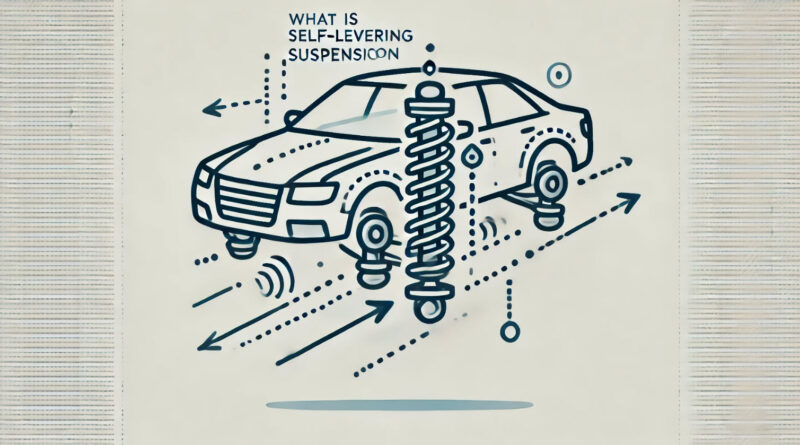What Is Self-Leveling Suspension, and Why Does It Matter?
Ever noticed how the back of a car seems to sag when it’s loaded with passengers or heavy cargo? That’s where self-leveling suspension steps in. This clever technology keeps your car at a consistent height, no matter how much weight it’s carrying or what kind of terrain you’re tackling. The result? A smoother, safer, and more comfortable drive.
What Exactly Is Self-Leveling Suspension?
Let’s explore how leveling suspension works and why it’s such a smart feature for modern vehicles. Leveling suspension is like having an automatic height-adjustment system for your car. When you add extra weight—whether it’s passengers, luggage, or even a trailer—the system adjusts the car’s height to keep it level. It’s not just about looks; it’s about making sure your car stays balanced, stable, and easy to control.
How Does It Work?
Here’s the cool part: leveling suspension does all the work for you. It uses sensors and a bit of engineering magic to maintain the perfect ride height. Here’s how it works in simple terms:
- It Senses Changes: When weight is added to the car, sensors detect that the ride height has dropped.
- It Takes Action: The system kicks in to lift the car back to its normal height using air, hydraulic fluid, or electronically controlled components.
- It Adjusts in Real Time: Whether you’re turning, braking, or hitting a bumpy road, the system keeps everything level and steady.
And the best part? You don’t have to push a button or flip a switch—it all happens automatically.
Why Does Self-Leveling Suspension Matter?
You might be wondering, “Do I really need this?” Well, here’s why self-leveling suspension can make a big difference:
1. Better Stability
A level car is a stable car. By keeping the vehicle’s height consistent, the system improves handling, especially during sharp turns or sudden stops.
2. Enhanced Comfort
Whether you’re on a long road trip or driving over potholes, self-leveling suspension absorbs bumps and keeps the ride smooth for everyone inside.
3. Improved Safety
Sagging cars can be harder to control, especially when towing or carrying heavy loads. Self-leveling suspension keeps the car balanced, making it safer on the road.
4. Easier Towing
If you’re pulling a trailer or caravan, this system ensures your car doesn’t tilt under the extra weight, giving you better control.
Who Benefits Most from?
While it’s a fantastic feature for anyone, certain drivers will appreciate it even more:
- Families: If you often travel with a car full of people and luggage, this system ensures everyone enjoys a stable, comfortable ride.
- Towing Enthusiasts: Whether it’s a trailer, boat, or camper, towing becomes safer and easier with self-leveling suspension.
- Luxury Car Owners: Many high-end vehicles come with this feature to provide a premium driving experience.
- Off-Road Adventurers: For those who love tackling rough terrains, self-leveling suspension helps maintain ground clearance and stability.
Different Types of Leveling Suspension
There are a few ways manufacturers achieve this magic, and the system you get depends on the type of car:
- Air Suspension: Uses airbags and an onboard compressor to adjust the car’s height.
- Hydraulic Suspension: Uses fluid-filled components to lift or lower the car.
- Electronic Systems: Sensors and motors work together to fine-tune the suspension for maximum comfort and control.
How Does It Compare to Traditional Suspension?
Here’s a quick look at why self-leveling suspension stands out:
| Feature | Self-Leveling Suspension | Traditional Suspension |
|---|---|---|
| Ride Height Adjustment | Automatic | Fixed, may sag with weight |
| Comfort | Enhanced | Varies depending on load |
| Stability | Always balanced | Can feel unstable when loaded |
| Ease of Use | Fully automatic | No adjustments possible |
Potential Issues and Maintenance Tips
Like any advanced feature, self-leveling suspension isn’t perfect. Here are some common issues to watch for:
- Leaks: Air suspension systems can develop leaks over time, leading to uneven ride heights.
- Worn Components: Parts like sensors or compressors may wear out and need replacing.
- Cost of Repairs: Maintenance can be more expensive than traditional suspension systems, so it’s worth keeping everything in check.
How to Keep It Running Smoothly:
- Inspect Regularly: Look for signs of sagging or uneven heights.
- Service the System: Follow your car manufacturer’s maintenance schedule.
- Don’t Ignore Warnings: If your dashboard shows a suspension alert, have it checked immediately.
Is It Worth Having?
If you value comfort, safety, and versatility, leveling suspension is absolutely worth it. Whether you’re carrying a heavy load, towing a trailer, or just want a smoother ride, it’s a feature that makes every drive better.
Final Thoughts
Leveling suspension might sound like a luxury, but it’s really about practicality and safety. It keeps your car stable, comfortable, and easy to control, no matter the load or road conditions.
If you’re shopping for a car and this feature is an option, it’s definitely worth considering. From family road trips to off-road adventures, leveling suspension makes sure every journey is as smooth and safe as possible.
Buying a used VW. Buying used vauxhall, BMW, Jaguar, Ford, Volvo, Range rover, Bentley, Aston Martin, Porsche, Ferrari, Lamborghini, Maserati, Hyundai, Tesla, Honda, Pagani

